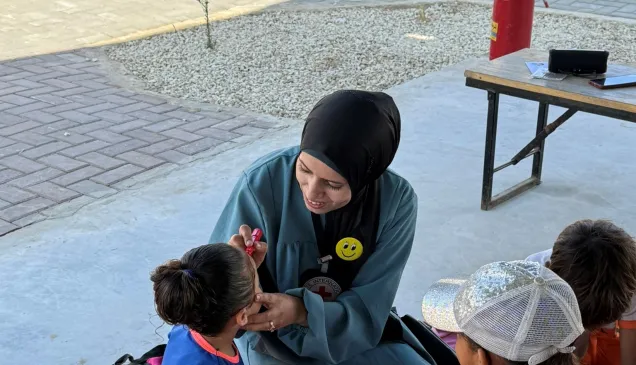Afghanistan: Stable electricity supply elevates health care at Mirwais Regional Hospital
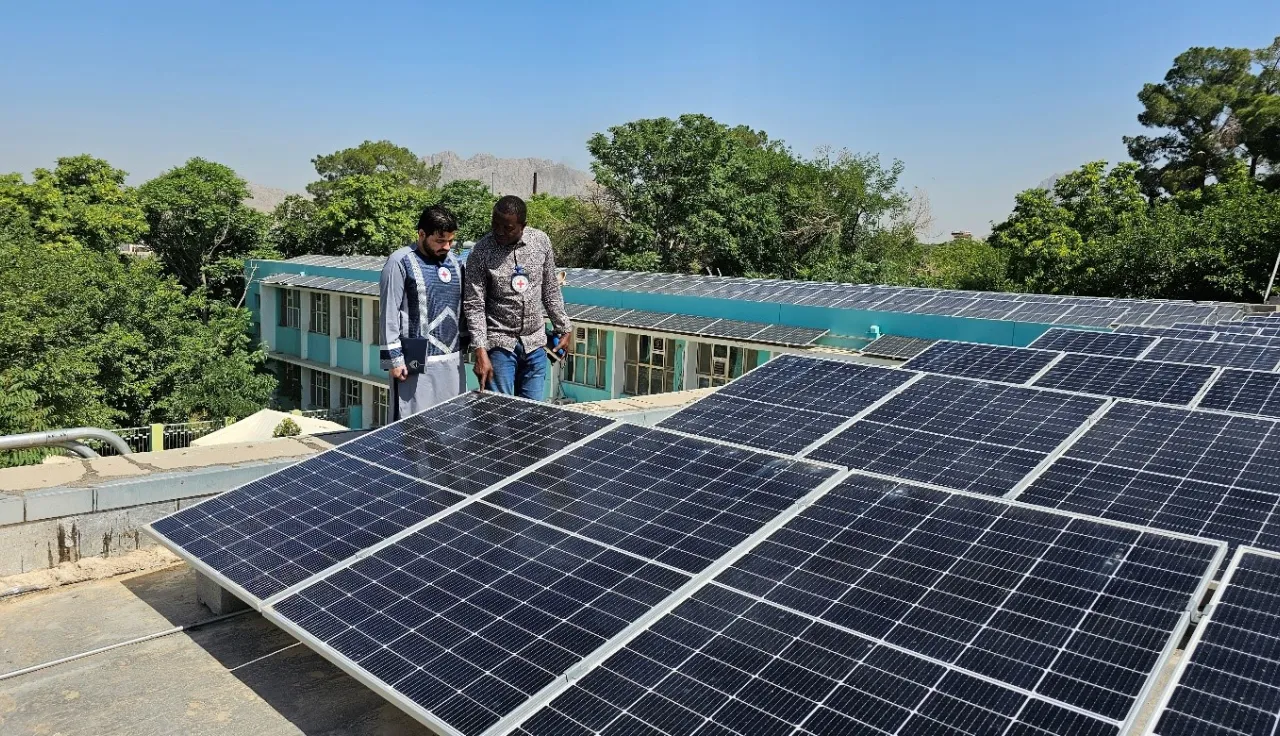
For years, the Mirwais Regional Hospital (MRH) in Kandahar grappled with unreliable electricity supply, significantly hindering its ability to function as a critical health care hub for over a million residents in the surrounding provinces. Historically, the hospital would receive only five to nine hours of daily electricity daily, of sub-par quality.
To bridge this gap, diesel generators were employed for an additional 15 to 20 hours each day, leading to increased carbon emissions and elevated electricity costs.
To address this persistent challenge, the International Committee of the Red Cross (ICRC) undertook two pivotal power projects for the hospital — constructing a dedicated medium voltage power line of 5.5 km connecting the hospital to the main feeder of the city grid and installing a 550 kWAC hybrid solar system.
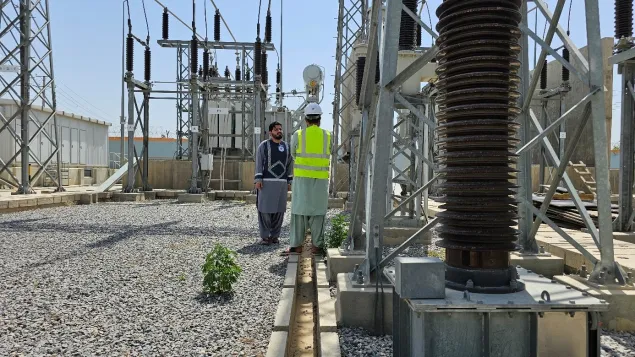
Ahmad Zia Abdali (on the left) assessing the dedicated power line to the Mirwais Regional Hospital with an official from Afghanistan’s electricity company, in the city’s electricity substation.
Ahmad Zia Abdali, ICRC Water and Habitat (WatHab) Engineer, remarked, “By the first quarter of 2023, we had successfully connected the hospital to reliable city grid power lines. This decision to leverage the city grid for the hospital was triggered due to the high costs associated with generators, the environmental hazards they posed and the excessive noise they created within the hospital.”
He added, “We also installed a hybrid solar power system to provide the hospital with sustainable and renewable energy, featuring pure sine wave voltage, which eliminates wastage and prevents damage to medical equipment.”
The hospital now benefits from uninterrupted electricity supplied by the hybrid solar system during the day and the city grid at night. As a result, there has been a notable improvement in health care services and a reduction in wait time for patients who travel great distances from remote areas to reach MRH.
During the hours when electricity consumption at the hospital is relatively low, surplus electricity generated by the hybrid solar system is injected into the city’s power grid, benefitting other essential public facilities such as local schools and community centers.
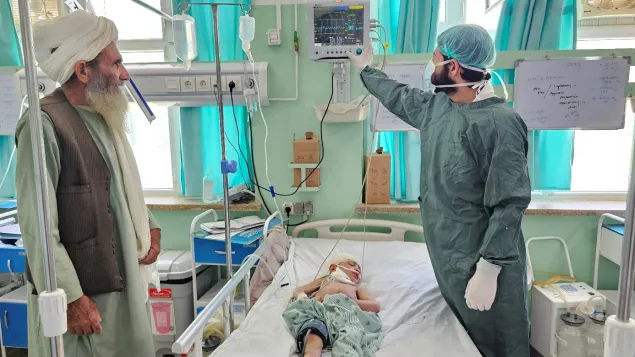
A doctor at the Mirwais Regional Hospital’s Intensive Care Unit (ICU) ward checks the patient monitoring machine.
The acting director of Mirwais Regional Hospital, Dr. Soorgul Nawzadi noted, “We provide health care to nearly 60,000 patients each month. However, unreliable electricity would previously hinder our ability to operate essential equipment, such as incubator machines, around the clock. Today, thanks to our connection to the city grid and a hybrid solar system, we get nearly uninterrupted electricity. This has not only enabled us to provide continuous care but also significantly reduced our electricity costs, as we no longer rely on generator fuel.”
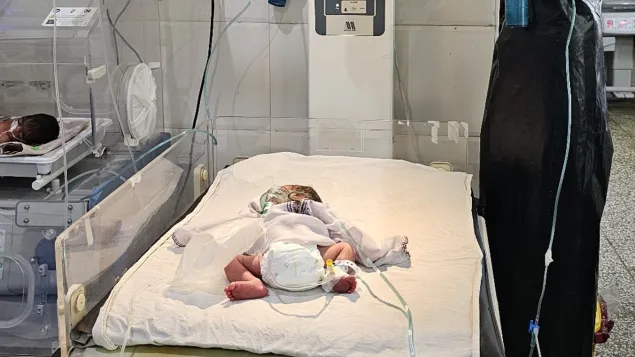
A baby in the neonatal ward of the Mirwais Regional Hospital.
Shabana and her baby, who are patients in the hospital, have greatly benefitted from the improved electrical infrastructure. Having delivered her baby prematurely at just six months, the new mother was filled with despair, fearing for her baby’s survival. But the incubators in the hospital, powered by a stable electricity supply, have allayed her fears. “I traveled from Helmand province to this hospital, and though I don't fully understand this machine, seeing my baby alive inside it fills me with immense joy," shared Shabana.
"Electricity is crucial for incubators, as they maintain a stable temperature akin to the mother's womb. These machines are indispensable for the survival of premature infants. In this ward, a consistent power supply is essential; without it, their survival is challenging," explained Sweeta, an ICU nurse in the pediatric ward of Mirwais Regional Hospital.
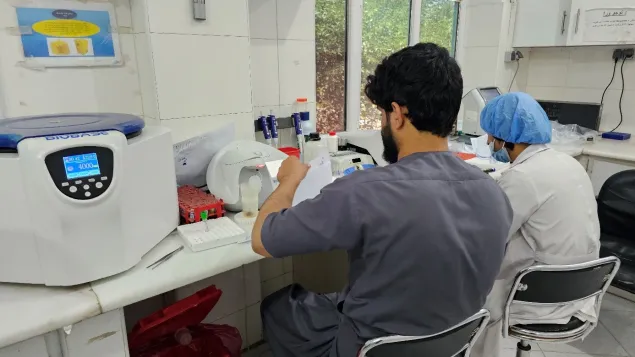
Laboratory technicians at the Mirwais Regional Hospital processing collected blood samples.
Hafiz Fida Mohammad, a laboratory technician at the hospital, shared, “Our laboratories conduct 48,000 to 58,000 examinations monthly. Previously, frequent power cuts would shut down our machines and we would lose valuable time inconveniencing our patients. Now, with a steady power supply, we can manage even increased patient load efficiently.”
The ICRC provided vital support to the Mirwais Regional Hospital from 1996 to 2023. This comprehensive assistance encompassed the provision of medicines, salaries, training, and the rehabilitation of infrastructure and medical equipment, ensuring the hospital's capacity to deliver critical care to its patients. The ICRC’s fuel donations — 270,000 liters in 2021, 414,000 liters in 2022, and 306,550 liters in 2023 — were crucial during power cuts in the hospital. However, with the new energy projects eliminating the need for diesel generators, the hospital’s carbon footprint has been reduced remarkably, by an average of 30 tonnes per month.

